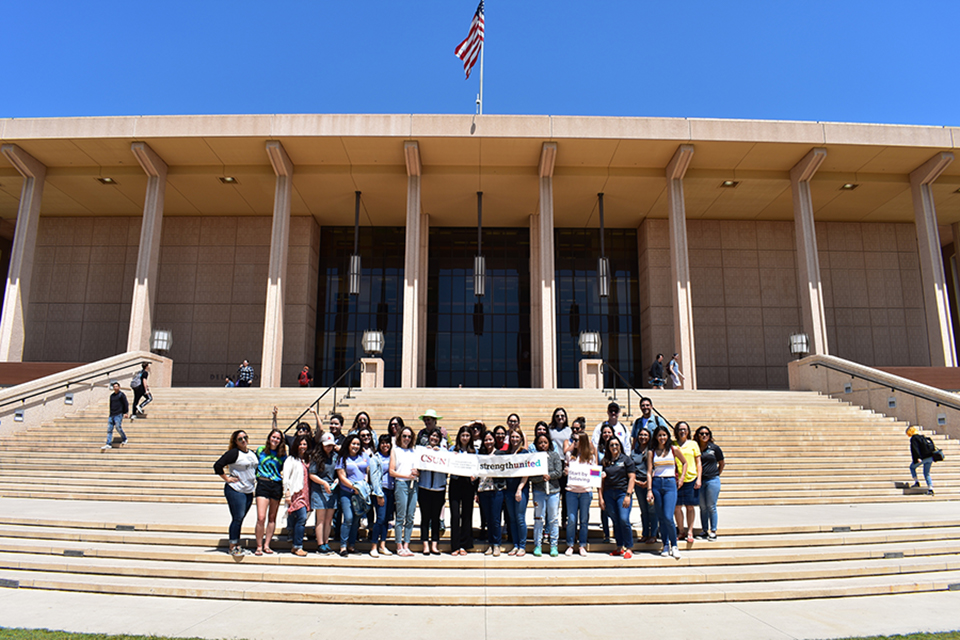Unsafe at Home: CSUN’s Strength United Continues to Support Abuse and Assault Survivors, Despite Social Distancing

CSUN students, faculty, staff and Strength United allies gather for Denim Day 2019, a day dedicated to raising awareness of sexual assault prevention, in front of the CSUN Library. Photo courtesy of Alexandra Strait
The COVID-19 pandemic has required people to stay at home as much as possible. For those in abusive households, “Safer at Home” orders heightened the risk factors associated with child maltreatment, domestic violence and sexual assault.
Rates of domestic violence are rising and many victims have understood the order to mean they cannot leave an abusive environment, said Kim Roth, a licensed marriage and family therapist and executive director of Strength United, a chartered center operated through California State University, Northridge’s Michael D. Eisner College of Education to assist those affected by violence, sexual abuse and trauma.
The Los Angeles County Department of Children and Family Services (DCFS) is reporting a 50 percent reduction in child abuse reports, “but we know this does not mean child abuse has decreased — as many cases are typically reported by people outside of the home, when school, daycares and camps are normally in session,” Roth said. Meanwhile, across the nation and citywide, there has been a reported 50 percent increase in calls to provider hotlines for assistance, crisis intervention, safe housing, support and other critical resources.
“It’s really clear that shelter-in-place has had profound consequences on those who do not live in safe spaces,” Roth said. In addition, members of the LGBTQIA+ communities may find themselves living in non-affirming environments contributing additional stressors to those brought about by the pandemic.
In order to meet the growing needs and to ensure continuation of their services. Strength United moved to a telehealth platform with the support of the campus, using HIPAA-compliant electronic audio/visual methods. Strength United’s Family Justice Center in Van Nuys, which co-locates multiple agencies under one roof to assist those affected by child abuse and domestic and sexual violence, remains open to perform acute forensic evidentiary exams. Strength United also continues to partner with the Los Angeles Police Department’s Domestic Abuse Response Team, responding on scene to domestic violence calls.
Roth said Strength United takes particular care to educate callers as to the benefits and risks associated with telehealth. She noted that many abusers heavily monitor a victim’s access to the internet and phone as a furtherance of power and control tactics.
Strength United’s prevention team and Pride United, a Strength United program that provides a safe space and affirming services for the LGBTQIA+ population, have been reducing feelings of isolation by reaching out to the community via social media.
To address the growing needs for safe housing, Strength United, along with 11 other domestic violence support providers, have partnered with Los Angeles Mayor Eric Garcetti’s office to ensure that people who need to leave unsafe environments can find shelter.
“When the Safer at Home orders were first implemented, we were all very aware that not everyone was safe in their home,” said Chanel Smith, policy director in the Mayor’s Office of Public Safety. “Through two guardian angels, we were able to secure enough funding to house 900 survivors over 10 weeks, to ensure that survivors could be kept safe during these uncertain times.
“Without amazing partner agencies like Strength United, we would not have been able to offer this life-saving resource,” Smith said. “At a time when everyone is scared, they have truly been a stabilizing force for their neighbors and the city as a whole. We are grateful to have them as partners through this pandemic.”
“We’re really excited to be able to provide telehealth,” said Alexandra Strait, one of Strength United’s Campus Care Advocates — a confidential resource on campus for members of the CSUN community. “We’re excited to be able to serve our community in that way. It’s really important to us that people still know that these services are still accessible.”
The move to telehealth has highlighted ways in which some barriers that vicitms have faced in the past, such as finding child care and transportation can be alleviated, Roth said, adding that Strength United is considering keeping telehealth as an option in the future once “safer at home” orders are lifted in Los Angeles County and beyond.
Strength United’s Crisis Hotline, run by CSUN student and community volunteers, is available 24 hours a day, seven days a week. The hotline is offering support to individuals experiencing COVID-19-related anxiety, in addition to services for survivors. If you or someone you know has been impacted by violence or trauma, call (818) 886-0453 in the San Fernando Valley or (661) 253-0258 in the Santa Clarita Valley or reach out through @strengthunitedcsun on Instagram and @strengthunited on FaceBook.

 experience
experience